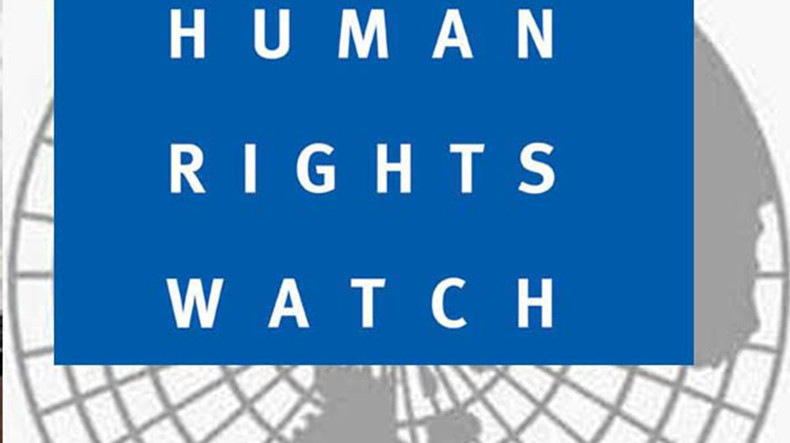Iranian authorities have ramped up their crackdown against human rights defenders, Human Rights Watch said today. Since August 31, 2018, they have arrested four more human rights defenders, as well as Reza Khandan, husband of the prominent imprisoned human rights lawyer Nasrin Sotoudeh, all in Tehran. The authorities should immediately release these human rights defenders, who appear to have been arrested solely for peaceful dissent.
On August 31, Mohammad Najafi, a human rights lawyer, posted on his Facebook page that the authorities had arrested two other human rights lawyers, Farokh Forouzan and Payam Derafshan, who had attended a gathering at the house of an imprisoned lawyer, Arash Keykhosrqavi. Derafshan represents Sotoudeh, whom authorities have detained since June. In the first days of September, authorities also arrested Hoda Amid and Najmeh Vahedi, two women’s rights defenders who are instructors for a workshop on equal rights in marriage, at their homes in Tehran. On the morning of September 4, the authorities arrested Khandan after he refused to appear for an interrogation.
“Iranian authorities continue to dig a hole for their domestic and international credibility as they lock up scores of lawyers and activists for the ‘crime’ of defending citizens’ fundamental rights,” said Sarah Leah Whitson, Middle East director at Human Rights Watch. “At a time when everyday life is increasingly difficult for millions of Iranians, rights advocates should be an essential part of solving collective problems, instead of a primary target of the government’s crackdown.”
Others recently arrested include, on August 18, Qasem Sholehsaadi, a lawyer who said in a video message that he was going to stand in front of the Iranian parliament to protest the Guardian Council’s “approbatory supervision,”which he described as the root cause of Iran’s problems. Authorities also arrested Arash Keykhosrqavi, another lawyer who accompanied him in his peaceful protest.
Over the past three decades, the Guardian Council, an unelected body of 12 Islamic jurists charged with vetting election candidates, has expanded its powers and arbitrarily barred hundreds of political candidates from running for office under its “approbatory supervision” powers.
On August 22, Derafshan who represented Keykhosrqavi and Sholehsaadi before he was arrested himself, told the Center for Human Rights in Iran that the prosecutor has charged Keykhosrqavi and Sholehsaadi with assembly and collusion to act against national security because of their peaceful protest.
Derafshan and Keykhosrqavi also represent the family of Kavous Sayed Emami, the prominent environmentalist who died in detention under suspicious circumstances in February.
A source who wished to remain anonymous told Human Rights Watch that Intelligence Ministry officials were waiting for Derafshan and Forouzan, and arrested them as they stepped out of the car to visit the family of their detained colleague.
Since June, the Intelligence Ministry has arrested several other human rights defenders for peaceful activism. On August 1, Intelligence Ministry authorities arrested Farhad Meysami, a human rights defender, protesting compulsory hijab laws. Meysami has been on a hunger strike since his arrest to protest the charges.
Derafshan, Sotoudeh’s lawyer, told Human Rights Watch in August that Branch 7 of the Tehran prosecutor’s office had summoned Sotoudeh after her arrest in June to inform her that the prosecutor in Kashan had filed a complaint against her for defending Shaparak Shajarizadeh, who faces charges for taking off her headscarf off in public in January to protest compulsory hijab laws. Sotoudeh was told she could be released on a 650 million Iranian toman bond (US$135,000) in that case. But Sotoudeh refused to pay the bond, because she said she was being targeted for her lawful work as a lawyer.
Authorities have now extended her temporary arrest warrant, Sotoudeh’s husband Khandan told Iranian Student News Agency on August 1. The prosecutors’ office has also charged Khandan with “assembly and collusion against national security,” “propaganda against the state,” and “promoting not wearing a veil,” apparently for having buttons that said, “I am against mandatory hijab,” Mohammad Moghimi, Khandan’s lawyer, told Human Rights Watch. The prosecutor also issued a 700 million Iranian toman bond (US$166,000) for Khandan, Moghimi said.
“The most reputable rights defenders, who have stepped up to be the messenger for millions of Iranians’ discontent, are now in jail,” Whitson added. “Authorities are only fueling instability with their silencing of peaceful dissent.”






















































